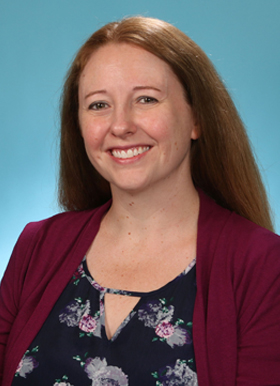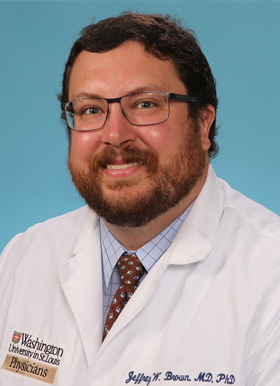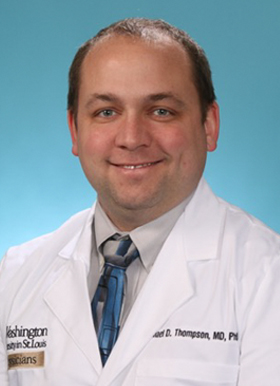
Megan Baldridge, MD, PhD
Assistant Professor
Division of Infectious Diseases
Washington University School of Medicine in St. Louis
Title of project: Regional regulation of enteric virus infection by the commensal microbiome
(5/01/17 – 4/30/19)
Dr. Baldridge is an Assistant Professor in the Department of Medicine, Division of Infectious Diseases. Her funded project will further uncover the interactions between the microbiome, virus, and the host in different regions of the intestine. She will determine the effects of the microbiome on regional cellular viral tropism throughout the intestine using viral quantification and immunofluorescence assays and define the specific bacteria associated with murine norovirus infection in different regions of the gut using laser capture microdissection followed by next-generation sequencing to identify bacterial taxa. Her studies will make use of newly-developed techniques to explore these questions from novel angles and pursuit of these aims will also facilitate development of new methods and technical expertise.

Jeff Brown, MD, PhD
Instructor in Medicine
Division of Gastroenterology
Washington University School of Medicine in St. Louis
Title of project: CEACAMs in Metaplasia and Oncogenesis
(5/1/18 – 7/31/20)
Dr. Brown is an Instructor in Medicine in the Department of Medicine, Division of Gastroenterology. His funded project will reveal and characterize cathartocytosis, a novel cellular process, required for metaplasia and oncogenesis in several tissues and demonstrate that assaying for this process is both a sensitive and specific tool for identifying premalignant and malignant cellular transformation throughout the GI tract.

Jaebok Choi, PhD
Assistant Professor
Division of Oncology
Washington University School of Medicine in St. Louis
Title of project: Effect of JAK1/JAK2 Inhibition on Intestinal Stem Cells and Tissue Repair
(5/01/17 – 4/30/19)
Dr. Choi is an Assistant Professor in the Division of Oncology. His funded project will determine the effect of baricitinib on ILCs using flow cytometry and Paneth cells and ISCs in the GI tract using immunofluorescence microscopy. Most patients receiving allo-HSCT suffer from GI GvHD, the major complication of allo-HSCT, due to human leukocyte antigen (HLA) mismatch. Dr. Choi’s work will provide mechanistic insights into not only GI GvHD, but also other chronic inflammatory diseases such as IBD, Crohn’s disease and ulcerative colitis. His study’s goal is to provide an inexpensive, safe and effective way of overcoming these diseases.

Vincenza Cifarelli, PhD
Assistant Professor
Division of Nutritional Science
Washington University School of Medicine in St. Louis
Title of project: CD36 regulation of gut lymphatics
(5/01/18 – 4/30/19)
Dr. Cifarelli is an Assistant Professor of Medicine in the Department of Medicine, Division of Nutritional Science. Her funded project will seek to better understand intestinal lymphatic system during lipid absorption. She will identify a novel regulation of lacteal maintenance and function mediated by the lipid translocase CD36. She will propose that CD36 promotes proteolytic maturation of vascular endothelial growth factor C, VEGF-C, during lipid absorption. She expects to dissect the molecular mechanisms that regulate proteolytic maturation and secretion of VEGF-C during lipid absorption. Her project’s hypothesis is that that lipid absorption induces, via CD36, secretion and maturation of VEGF-C, to help prime the lacteals for chylomicron uptake and lipid transport. She will hypothesize that CD36 mediates regulation of lacteal regeneration and function during the fasting/refeeding conditions.

Kyle McCommis, PhD
Assistant Professor
Division of Geriatrics and Nutritional Science
Washington University School of Medicine in St. Louis
Title of project: Inhibiting pyruvate metabolism to treat hepatic fibrosis
(5/01/18 – 4/30/19)
Dr. McCommis is an Assistant Professor in Medicine in the Department of Medicine, Division of Geriatrics and nutritional Science. His funded project will investigate the importance of a metabolic process in the regulation of fibrosis development in fatty liver disease. As the amount of fibrosis is the best indicator of morbidity and mortality from fatty liver disease, understanding how to limit or reverse liver fibrosis would be key to improving health from this highly common disease.

Michael Thompson, MD, PhD
Instructor in Pediatrics
Pediatrics – Endocrinology
Washington University School of Medicine in St. Louis
Title of project: Impact of Maternal Obesity on Bile Acid Homeostasis and Risk for Liver Fibrosis in Offspring
(5/1/18 – 7/31/20)
Dr. Thompson is an Instructor in Pediatrics in the Department of Pediatrics, Endocrinology. His funded project will characterize bile acid metabolism in mouse offspring exposed to maternal high fat/high sugar diet before and after exposure to fatty liver disease inducing diets. Once a mechanistic link is proven between altered bile acid metabolism after maternal HF/HS diet exposure and risk for NAFLD progression, this information will be used to design bile acid based preventative therapies to prevent disease progression in those patients who are at risk.